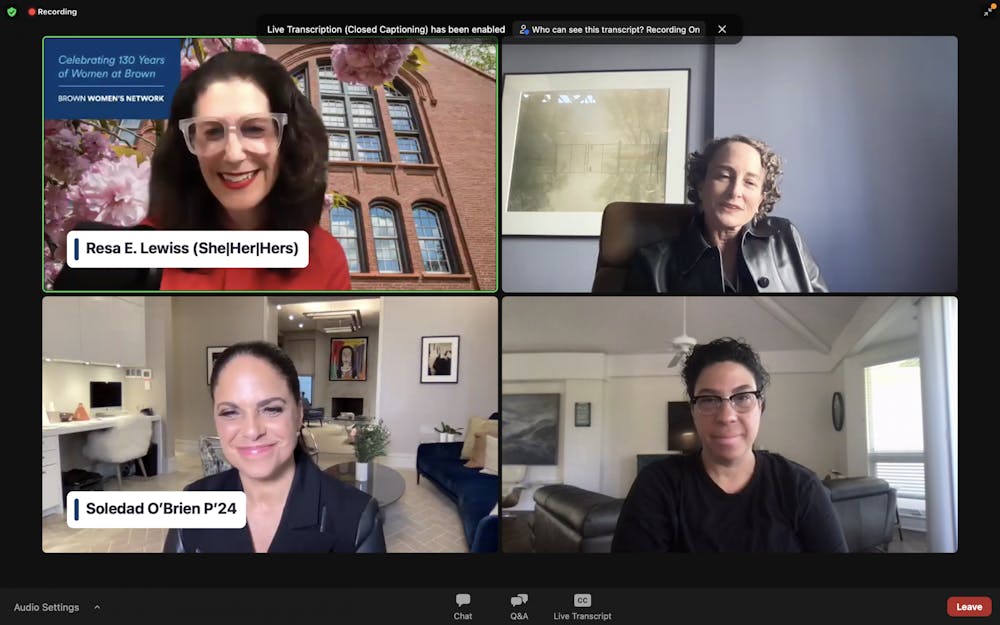In a discussion hosted by the Brown Women's Network, a panel of female University alums and parents discussed their careers in television, film and media, as well as the importance of female mentorship.
The event, titled “Changing an Industry: Women in Television, Film & Media,” is part of a series of lectures hosted “to honor the past, the present and hopefully that even more inclusive future of all women at Brown” and in celebration of the 130th anniversary of the BWN, said Andra Bowman Ehrenkranz ’87 P’24 ’26, a member of the Women's Leadership Council who introduced the event.
The event was hosted by Resa E. Lewiss MD'92, a BWN member and organizer of the event. The panel included Nina Jacobson ’87 P’23, a senior film executive who has shepherded films such as “Pirates of the Caribbean” and “The Sixth Sense” and produced television shows like “Pose” and “The People v. O.J. Simpson: American Crime Story.” Soledad O’Brien P’24, another panelist, is an anchor and producer on the Hearst TV political magazine program "Matter of Fact with Soledad O'Brien” and founder of her own multi-platform media production company Soledad O’Brien Productions. Angela Robinison ’92, who wrote and directed the film “Professor Marston & The Wonder Women” and wrote and produced television shows such as “True Blood” and “The L Word,” also served as a panelist.
The discussion began with the panelists talking about how the experiences and spaces they frequented at Brown influenced their careers.
When she wasn’t working in the Blue Room, Robinson spent a lot of her time at Brown in the Production Workshop. Pitching to the “rigorous” PW board “really prepared me … for pitching in real life,” she said. “I feel like it was the best training I got.”
“For me, spending time in Production Workshop and Leeds (Theatre) doing theater was my first time ever really thinking of myself as a person who might go into a creative area,” Jacobson said. “To be in a space where people made things, and to be part of the excitement and urgency and chaos of production was really transformational for me.”
For students still discovering their identity and path in life, “that sense of discovery and allowable uncertainty is really an important thing in college,” Jacobson added.
O'Brien said that her advice to young people is to invest time into figuring out their interests, goals and identity so they can “really grow and leverage what you can do best,” without worrying about how others will label you. She added that she applies this mindset both to her personal identity, specifically as a biracial woman, as well as her professional identity as a writer, reporter and filmmaker.
Despite their current success, the panelists also discussed challenges and setbacks in their early careers and how they overcame these obstacles.
“There's a real growth period,” O’Brien said. “What were the things that I could have controlled? What can I learn from this that I could have managed better? I have found (that) in every terrible situation, focusing on this has helped.”
The conversation then moved to a discussion about the importance of mentorship and sponsorship, particularly amongst women in a male-dominated field.
The film industry is “still fundamentally a white, male patriarchal business … in terms of ownership and real decision-making. It has not changed structurally, even though it is changing,” Jacobson said. As an executive and producer, she is mindful of expanding access to young people who lack resources, she added.
“As I have gotten older, I really come to believe that … the purpose and meaning of having power is actually to give power away,” Jacobson said. “The more of it you give … the less of it you need.”
It’s important that young people starting out in the film industry think of mentorship and sponsorship as give-take relationships,” Robinson said. “Coming out of (a) place like Brown where … you've been told for so long that your ideas are amazing … it’s really a big smack in the face to enter the real world,” she added.
As opposed to thinking of mentors and sponsors as people that simply provide and support your ideas, young people starting out in the film industry should focus on building lasting relationships with potential mentors, Robinson added.
Ask yourself, “how am I going to have a conversation with this person? What are they getting out of it? … And how do we collectively leverage that into something that will make them want to stand up for me in that room?” Robinson said.
Jacobson emphasized the importance of persistence for people entering the film industry. “Sometimes you have to believe that you can do something in the absence of any evidence whatsoever that you can do it. And if you have a story to tell, you just keep writing scripts … because very rarely does a person the first time they try it … just nail it.” And in the age of online platforms, “anybody can tell their story. Anybody can put it out there. And people are always looking because there is … an insatiable appetite for more content.”
“No matter what the technology or what the changing times are like, people love a well told story,” Robinson added. Despite the challenges of the film and media industry, Robinson loves what she does at its core: writing and telling stories. “You can make a version of the world that reflects the way you see it … and share that with other people.”





